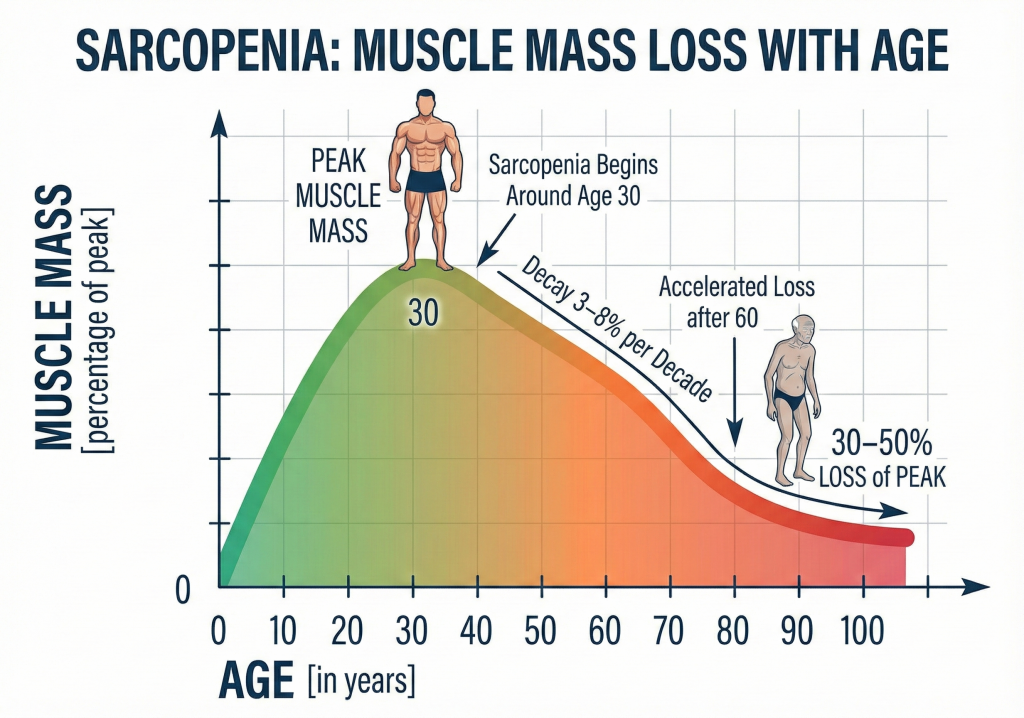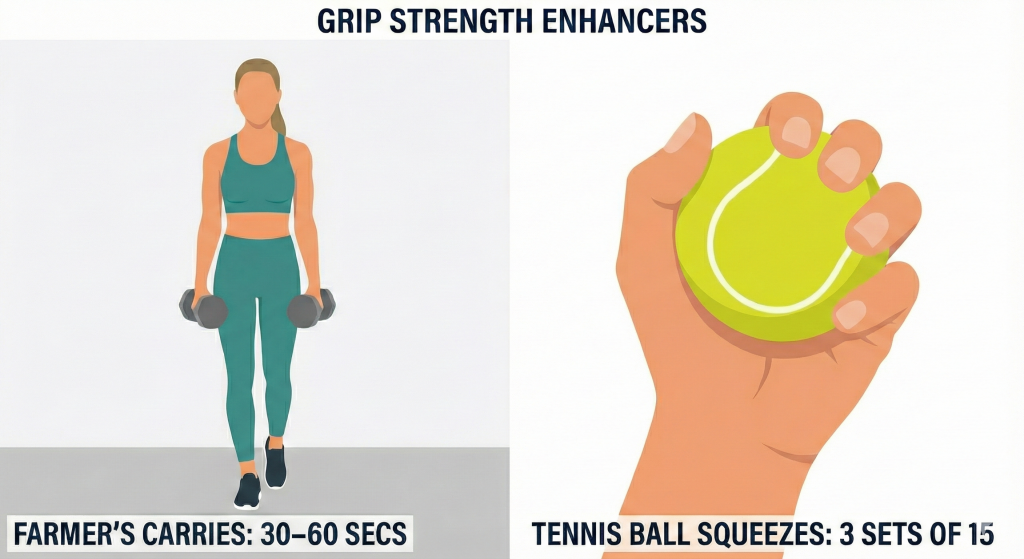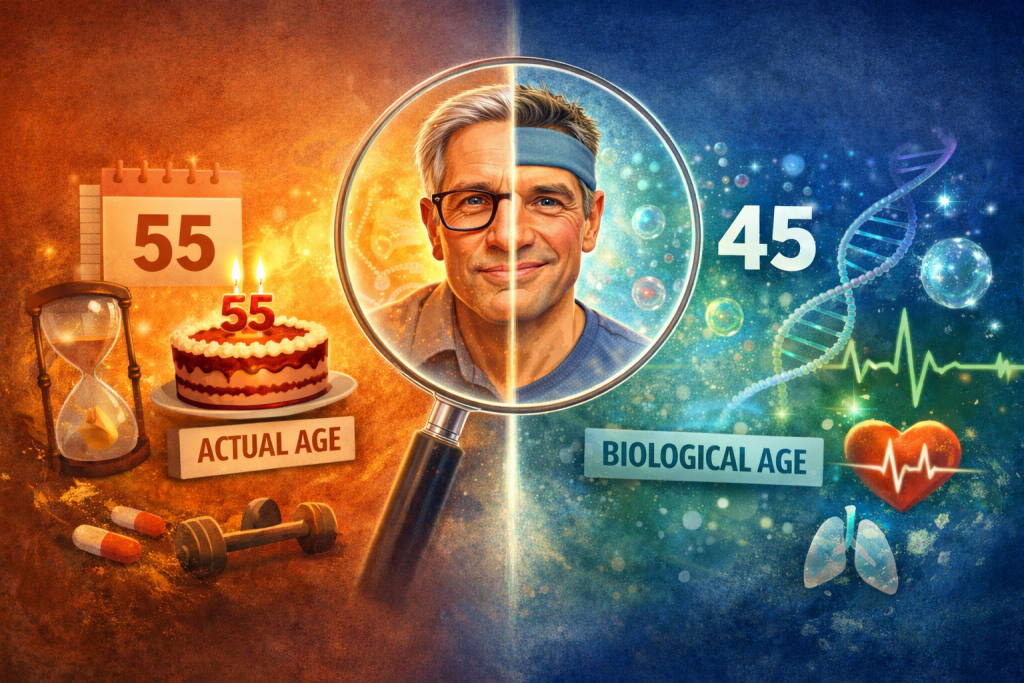 Usually, when we talk about muscles, it is with a mindset akin to how we think about biceps or abdominals. However, let me share with you a reality that most people do not realise: muscles are among the most potent factors in ensuring healthy ageing and longevity.
Usually, when we talk about muscles, it is with a mindset akin to how we think about biceps or abdominals. However, let me share with you a reality that most people do not realise: muscles are among the most potent factors in ensuring healthy ageing and longevity.
Recently discovered research shows that your muscles work in an organ-like system. Think of your muscles not just with a focus on developing them for aesthetic qualities, but also with a thought to developing them because you want to live a longer life.
Why Muscle Matters More Than You Think
- Metabolic powerhouse: Muscle tissue is a major glucose burner and a site of insulin sensitivity. Increased muscle mass promotes resistance to both diabetes and metabolic syndrome.
- Hormonal regulator: It affects hormones such as IGF-1 and Testosterone, which are relevant in repair and recovery.
- Immune System Support: Muscles secrete myokines, which are signalling proteins that have anti-inflammatory and immune system-supporting effects.
- Balance and movement: Strong muscles help to prevent falling, which can aid in maintaining a degree of independence in old age.
“Muscle is not just strength; it’s healthspan insurance.”
Sarcopenia Begins Around Age 30: Here’s Why
Sarcopenia is a progressive loss of strength and muscle mass with increasing age. The sneaky thing is it starts way before most people think it does often as early as age 30.
 After your early 30s, your muscle mass will decay at a rate of 3–8% each decade, accelerating after you reach 60 years of age. So, when you reach your 70s and 80s, you may have lost a staggering 30–50% of your muscular peak.
After your early 30s, your muscle mass will decay at a rate of 3–8% each decade, accelerating after you reach 60 years of age. So, when you reach your 70s and 80s, you may have lost a staggering 30–50% of your muscular peak.
Why does this happen?
- Sedentary lifestyles: A reduction in activity informs your muscles that they are not required.
- Hormonal Changes: Testosterone, estrogen, and growth hormones decrease with each passing year, affecting the body’s capacity to produce muscular tissue.
- Protein intake declines: Not many people consume adequate good-quality protein, especially senior citizens.
- Inflammation and insulin resistance: Chronic low-grade inflammation, a consequence of ageing, can affect the repair and regeneration of muscle.
The effects go beyond reduced strength. They include lower metabolism, increased fat storage, high chances of falling, and reduced resistance to diseases.
Muscle Mass Is a Better Predictor of Life Span Than BMI
You have likely seen BMI charts which classify you into underweight, normal, overweight, or obese categories depending on your height and weight. However, BMI remains notoriously blind to one important factor: it fails to separate muscular mass from fatty mass.
Two people with equal BMI can have vastly different health statuses based on this factor. Studies have found that higher muscle mass and strength are better predictors of life span than BMI. Those with higher levels of lean mass have better survival rates and fewer disabilities later in life.
It’s not how much you weigh, it’s what your weight is made of.
The Micro-Workouts That Restore Strength After 50
The good news is muscles can be rebuilt and made stronger at all ages. Even if you are over 50, you can reverse muscle loss. Long workout sessions aren’t required; the intensity of your effort matters more.
Here are micro-workouts that work:
- Daily Strength Circuit (10 minutes)
Perform this activity 3–5 times a week.

- Bodyweight squats x 12
- Push-ups (on knees if necessary) x 10
- Glute bridges x 15
- Plank hold 30–45 seconds
- Standing calf raise x 15
- Rest for 60 seconds. Repeat if you have more time.
- Grip Strength Enhancers
Grip strength is an excellent predictor of longevity.

- Farmer’s carries: Hold two weights in each hand, walk for 30–60 seconds.
- Tennis ball squeezes: Perform 3 sets of 15 squeezes.
- Functional Strength with Resistance Bands
Bands are gentle on joints and very effective.

- Banded rows: 3 sets of 12
- Banded leg lifts: 3 sets of 15 on each side
- Banded Chest Press: 3 sets of 10
- Move slowly and control your strokes.
- Interval Walks
Pacing is not all; intensity variation matters too.
- Warm-up 5 minutes
- Alternate 1 minute brisk walk with 1 minute comfortable walk for 12–15 minutes
- Cool down 3–5 minutes
Nutrition & REST: You Can’t Ignore This
Exercise is only half the equation. The other half is nutrition and recovery.
- Protein: Having protein in each meal is important. The goal is to consume at least 20–30g of good-quality protein per meal to promote muscle protein synthesis. Foods such as eggs, milk, legumes, fish, poultry, tofu, and lentils will work wonders.
- Sleep: Growth and repair occur in sleep. Disrupted sleep affects hormones that regulate appetite and muscle formation.
The New Longevity Organ Isn’t a Myth
Muscles don’t exist simply for strength and aesthetics. They are a major hub for your metabolism, immune system, and life energy. Preserving and developing your muscles is the most important thing you can do to promote healthy ageing.
Losing muscle doesn’t have to be an inevitability. With proper habits and support structures in place, you can keep your strength and independence well into your senior years.
Age is real, but your ageing physiology? Negotiable. With your muscles at the core of your approach to living a long life, you will write your own playbook when it comes to ageing.
We hope this article helps you. For further information or guidance, reach out to our certified experts by subscribing to GOQii’s Personalised Health Coaching here.
#BeTheForce
Disclaimer: The information provided in this blog is for general awareness and educational purposes only. It is not intended to replace professional medical advice, diagnosis, or treatment. Always consult a qualified healthcare provider for personalised medical guidance or concerns related to your health. Images shown are for representation purposes only and may not depict the exact recommendations or outcomes.
 Most of us are pretty familiar with our age, which we celebrate every year on our special day. Here’s an interesting thought, though: this number does not necessarily indicate how well our bodies are ageing. Two people, both aged 50, can have vastly different health profiles.
Most of us are pretty familiar with our age, which we celebrate every year on our special day. Here’s an interesting thought, though: this number does not necessarily indicate how well our bodies are ageing. Two people, both aged 50, can have vastly different health profiles. Once upon a time, our ancestors roamed the land, hunting for food and escaping predators. They were constantly on the move, adapting to their environment and surviving against the odds.
Once upon a time, our ancestors roamed the land, hunting for food and escaping predators. They were constantly on the move, adapting to their environment and surviving against the odds. As we prepare to bid adieu to 2025 and step into the vast possibilities of 2026, the tradition of setting New Year’s Resolutions looms over us. It is that time of year when we pledge to shed old habits and embrace new beginnings.
As we prepare to bid adieu to 2025 and step into the vast possibilities of 2026, the tradition of setting New Year’s Resolutions looms over us. It is that time of year when we pledge to shed old habits and embrace new beginnings.


